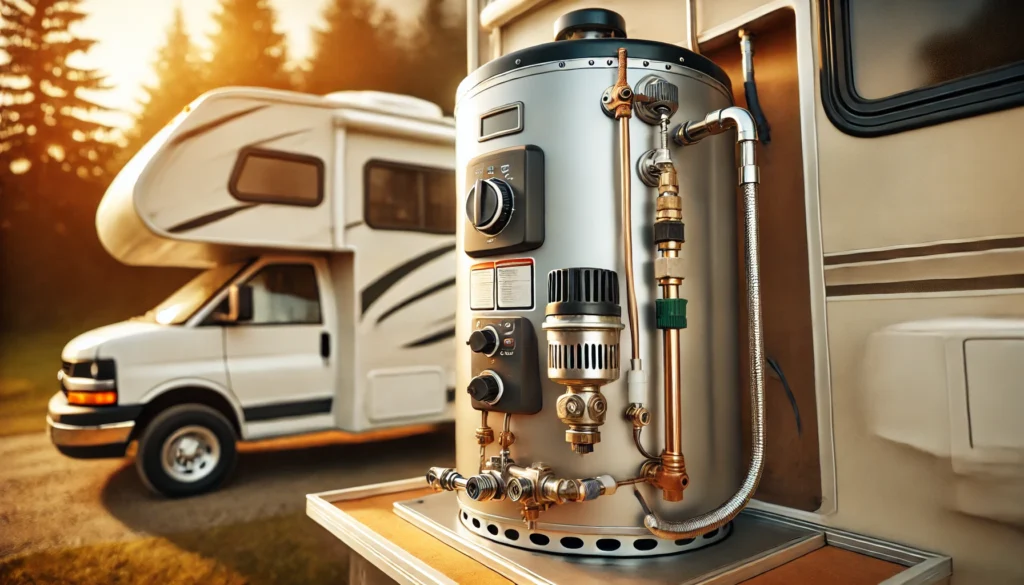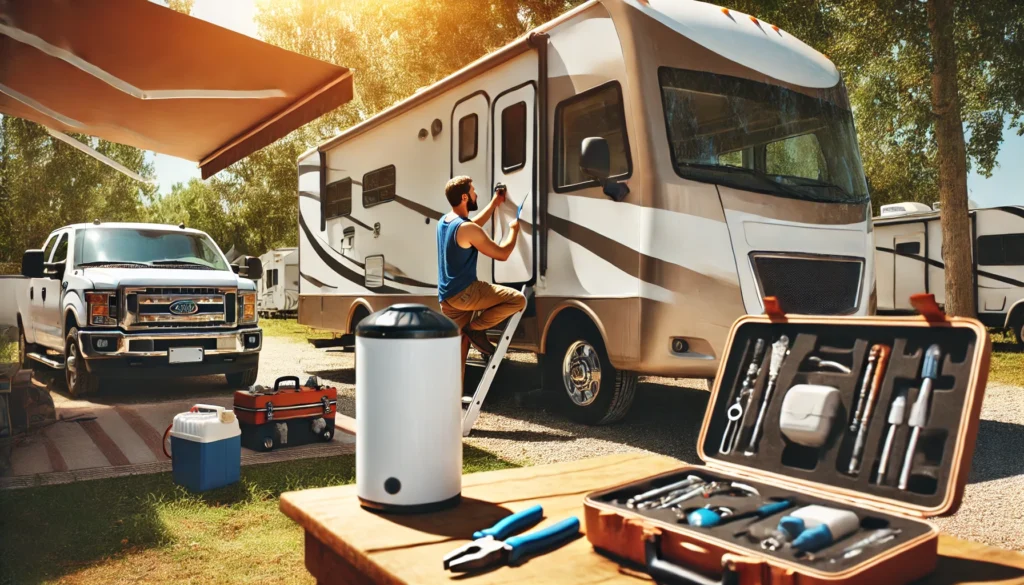🔥 Choosing the Best RV Water Heater for Your Journey
Choosing the right water heater for your recreational vehicle (RV) is essential for comfort and convenience. There are several types, each with its own set of features, advantages, and disadvantages.
1️⃣ Tank-Based (Storage) Water Heaters
📌 Common Capacity: 6-10 gallons
📌 Power Source: Gas, electric, or dual-mode (gas/electric)
✅ Pros:
- Reliable and widely available
- Simple installation and operation
- Can operate on propane, electricity, or both
❌ Cons:
- Limited hot water supply
- Slow recovery time
- Takes up space in the RV
🔎 Best For: RVers who prefer a simple, proven solution with basic maintenance.
💡 Explore More: How does the recovery time of a tank-based heater compare to a tankless model?

2️⃣ Tankless (On-Demand) Water Heaters
📌 Key Feature: Provides unlimited hot water instantly
📌 Power Source: Propane or electricity

✅ Pros:
- Endless hot water supply
- Energy-efficient (only heats water when needed)
- Saves space in the RV
❌ Cons:
- Higher upfront cost
- Requires good water pressure
- May have a slight delay before producing hot water
🔎 Best For: Full-time RVers or those who want continuous hot water without waiting.
💡 Explore More: What are the best RV tankless water heaters available on the market?

3️⃣ Motor-Aid Water Heaters
📌 Key Feature: Uses engine heat to warm water while driving
📌 Power Source: Engine heat (supplements other sources)
✅ Pros:
- Efficient use of engine heat
- Reduces reliance on propane or electricity
- Provides hot water upon arrival at the campsite
❌ Cons:
- Limited to travel days
- Not standard in all RVs
🔎 Best For: RVers who travel long distances frequently.
💡 Explore More: Can you retrofit a motor-aid water heater into an older RV?

4️⃣ Heat Pump Water Heaters
📌 Key Feature: Extracts heat from ambient air to warm water
📌 Power Source: Electricity
✅ Pros:
- Highly energy-efficient
- Lower operational costs
❌ Cons:
- Expensive upfront
- Requires warm temperatures for best performance
- Less common in RVs
🔎 Best For: Eco-conscious RVers traveling in warm climates.
💡 Explore More: How do heat pump water heaters compare to traditional electric models in efficiency?

🔧 Common Maintenance Practices
Regular maintenance helps extend the lifespan and efficiency of an RV water heater.
📌 1. Flushing the Tank (For tank-based heaters)
✔️ Drain the tank periodically to remove sediment buildup.
✔️ Use a water heater flush wand or vinegar solution for deep cleaning.
📌 2. Checking the Anode Rod (For storage water heaters)
✔️ Inspect annually; replace if 75% corroded.
✔️ Protects the tank from rust and corrosion.

📌 3. Cleaning the Burner and Vent (Gas Models)
✔️ Check for debris, dust, or insects.
✔️ Use compressed air or a brush to clean components.
📌 4. Inspecting Electrical Elements (For electric models)
✔️ Ensure heating element and wiring are free from corrosion.
✔️ Test the thermostat for correct temperature control.
📌 5. Winterizing the Water Heater
✔️ Drain the heater before winter storage.
✔️ Bypass the heater when adding RV antifreeze.
💡 Explore More: What are the best tools and products for RV water heater maintenance?

⚠️ Troubleshooting Common Issues
Even well-maintained RV water heaters can encounter problems. Here are some common issues and solutions:
| ❌ Issue | 🔍 Possible Cause | 🛠️ Solution |
|---|---|---|
| No hot water | Gas models: Pilot light out | Check propane levels and relight pilot |
| Electric model not heating | Power issue | Ensure power connection and test heating element |
| Water too hot/cold | Thermostat setting | Adjust thermostat or replace faulty unit |
| Water leaks | Loose fittings or worn seals | Tighten connections or replace seals |
| Strange noises | Sediment buildup | Flush tank and check anode rod |
| Pilot light won’t stay lit | Clogged burner or thermocouple issue | Clean burner and check gas pressure |
💡 Explore More: What are the most common reasons an RV water heater stops working?

🔥 Final Thoughts on RV Water Heaters
Choosing the right RV water heater depends on your travel habits and energy preferences. Whether you opt for a traditional storage heater, a tankless model, or a motor-aid system, regular maintenance and timely troubleshooting will ensure reliable hot water on your journeys.








